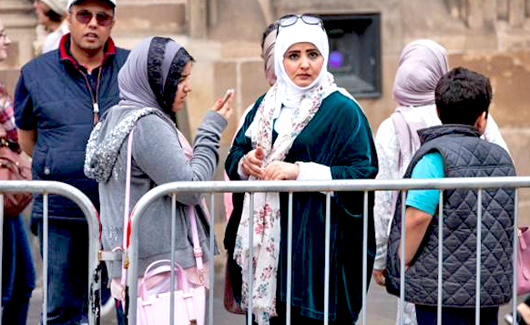
London, Nov 30: Muslims are facing the worst job discrimination of any minority group in Britain, according to new research which found that they had the lowest chance of being in work or in a managerial role.
Muslim men were up to 76 per cent less likely to have a job of any kind compared to white, male British Christians of the same age and with the same qualifications. And Muslim women were up to 65 per cent less likely to be employed than white Christian counterparts.
Muslims were the most disadvantaged in terms of employment prospects out of 14 ethno-religious groupings in the UK, researchers Dr Nabil Khattab and Professor Ron Johnston found using data from the Office for National Statistics' Labour Force Survey of more than half a million people. Skin colour made little difference to the figures.
Nabil Khattab, of Bristol University, said the situation was "likely to stem from placing Muslims collectively at the lowest stratum within the country's racial or ethno-cultural system due to growing Islamophobia and hostility against them.
"They are perceived as disloyal and as a threat rather than just as a disadvantaged minority," he added. "Within this climate, many employers will be discouraged from employing qualified Muslims, especially if there are others from their own groups or others from less threatening groups who can fill these jobs."
Khattab said the "penalties" for being Muslim got worse when applying for better-paid managerial or professional jobs.
"If this persists, it could have long-term implications for the cohesion of the UK's multi-ethnic, multicultural society. The exclusion of well-qualified black and Muslim individuals could undermine their willingness to integrate in the wider society," he said.
For women, Muslim Pakistanis and a "Muslim other" group were 65 per cent less likely to have a job, with Muslim Indians 55 per cent, Muslim Bangladeshis 51 per cent and white Muslims 43 per cent less likely. For men, the "Muslim other" group was 76 per cent less likely to be in work, followed by Muslim
Bangladeshis (66 per cent), white Muslims (64 per cent), Muslim Pakistanis (59 per cent) and Muslim Indians (37 per cent), the Social Science Journal study found.
White British men and women of no religion were, respectively, 20 and 25 per cent less likely to have a job than Christians. Black Christians with Caribbean origins were 54 per cent and 48 per cent less likely.
The only ethno-religious group with better work prospects than white British Christians were British Jews, with women and men 29 and 15 per cent more likely to be employed.
Of those in work, the researchers found only 23 per cent and 27 per cent of Muslim Bangladeshis and Muslim Pakistanis, respectively, had a salaried job. White British Jews had the highest rates, with 64 per cent in salaried jobs, followed by Hindu Indians and white Christian Irish on 53 and 51 per cent respectively. White British Christians, white British of no religion and black Christian Africans were all above 40 per cent.
Khattab added: "The main components of this discrimination are skin colour and culture or religion. But colour is dynamic, which means white colour can be valued in one case, but devalued when associated with Muslims. Equally, having a dark skin colour - Hindu Indians, for example - is not always associated with any significant penalty."






Comments
Add new comment